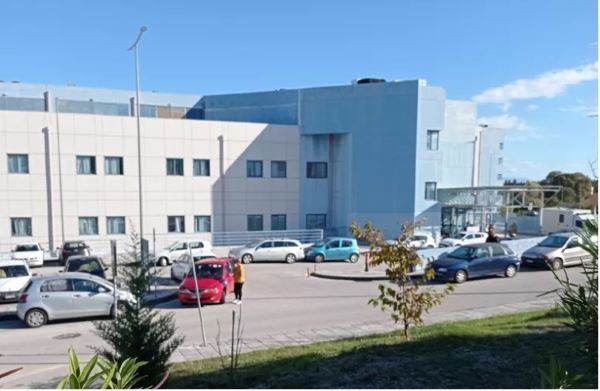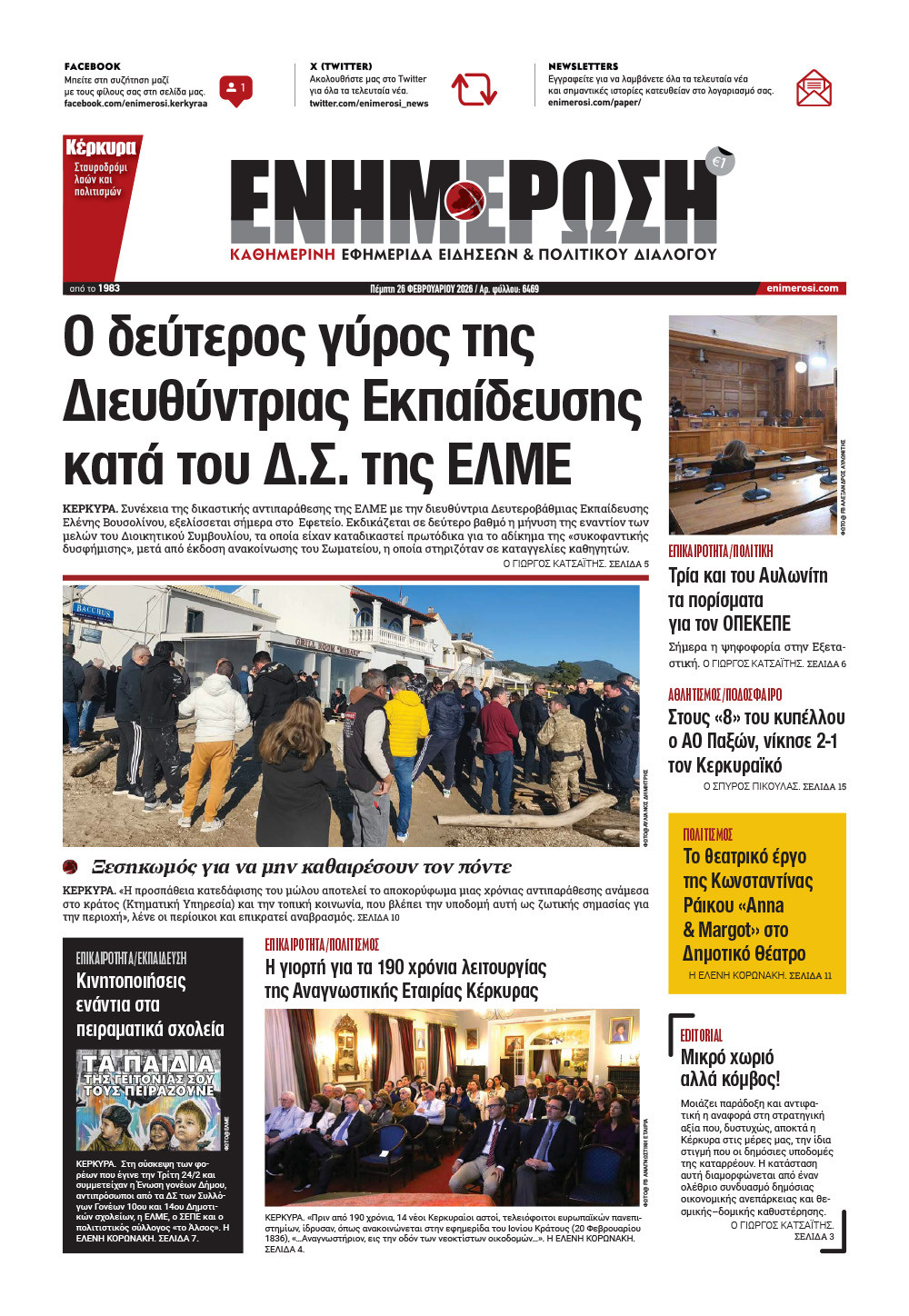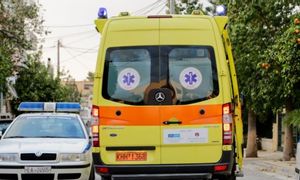Tragedy as pregnant woman loses premature baby at Corfu Hospital

death
27 Απριλίου 2023
/ 09:25
CORFU. The rapid deterioration in her condition did not allow enough time for transfer to another hospital by sea and no air transportation was available.
Yesterday evening, the complications that a 28-year-old pregnant woman in her 28th week of pregnancy developed had a tragic outcome.
The rapid deterioration in her condition did not allow enough time for transfer to another hospital with a neonatal clinic by sea and it was impossible to find air transportation.
The woman was rushed to the operating room for a caesarean section, however, despite the doctors' and nurses' efforts, the newborn baby did not survive. The mother received support from the psychiatric clinic to help her cope with the tragic loss.
The hospital issued the following statement:
Corfu General Hospital administration was informed of a report on the news website "kerkyrasimera.gr" titled "Corfu: Premature birth and two-and-a-half--hour search for air transportation for transfer!" which reports the following events: On 25/04/2023 at approximately 6:00 pm, a 28-year-old woman, who was in her 28th week of pregnancy, arrived at the Emergency Department complaining of pain.
The woman was under the care of a private obstetrician who recommended her transfer to the hospital. She was promptly treated by the on-duty obstetrician at the hospital, underwent clinical and imaging examinations, and was advised to remain under observation. As the 28-year-old woman had mild bleeding, the on-duty doctor requested that the Health Operations Centre of the EKAB National Centre for Emergency Care transfer her to the University Hospital of Ioannina together with another pregnant woman with a twin pregnancy, who had already been scheduled for transfer, due to the risk of extremely premature delivery.
The on-call paediatrician was put on standby in case there was a change in the clinical picture and an emergency caesarean section needed to be performed at our hospital. During the preparation for transfer, one of the two women had vaginal bleeding, so the plan changed. An emergency cesarean section had to be performed to save the woman's life and reduce the chances of intrauterine fetal death.
The 28-year-old mother was informed by the on-duty doctors that an emergency caesarean section had to be performed at an extremely premature gestational age, given the existing risks and the facilities of a secondary hospital on an island. Before the caesarean section was performed, the on-duty paediatrician, due to the extreme prematurity, set up procedures for immediate transfer if the clinical condition of the newborn allowed any movement.
At 8:20 pm, a male premature baby was born with a low birth weight and in a very critical condition that did not allow any movement. For two hours, the hospital paediatricians, in collaboration with the on-duty anaesthesiologist, performed intensive resuscitation efforts with the assistance of a neonatologist from the "ATTIKON" University Hospital, where the newborn baby would have been transferred if it could be moved.
The baby passed away at 10:20 pm after the superhuman efforts of the doctors. It is clear that in every serious incident before transferring to a tertiary hospital, a complete assessment and stabilisation are required to ensure the best possible outcome for the patient's life. This was vital for the mother who was treated for vaginal bleeding in a proper gynaecological clinic and was not in an ambulance or aircraft.
Corfu General Hospital did everything to save both the mother and the newborn. They managed to save the mother. The hospital has highly skilled medical and other personnel and all the necessary means to provide the care that patients require. There are no shortages of resources.
Corfu General Hospital administration makes decisions and manages according to the written provisions and there is no illegality.
The rapid deterioration in her condition did not allow enough time for transfer to another hospital with a neonatal clinic by sea and it was impossible to find air transportation.
The woman was rushed to the operating room for a caesarean section, however, despite the doctors' and nurses' efforts, the newborn baby did not survive. The mother received support from the psychiatric clinic to help her cope with the tragic loss.
The hospital issued the following statement:
Corfu General Hospital administration was informed of a report on the news website "kerkyrasimera.gr" titled "Corfu: Premature birth and two-and-a-half--hour search for air transportation for transfer!" which reports the following events: On 25/04/2023 at approximately 6:00 pm, a 28-year-old woman, who was in her 28th week of pregnancy, arrived at the Emergency Department complaining of pain.
The woman was under the care of a private obstetrician who recommended her transfer to the hospital. She was promptly treated by the on-duty obstetrician at the hospital, underwent clinical and imaging examinations, and was advised to remain under observation. As the 28-year-old woman had mild bleeding, the on-duty doctor requested that the Health Operations Centre of the EKAB National Centre for Emergency Care transfer her to the University Hospital of Ioannina together with another pregnant woman with a twin pregnancy, who had already been scheduled for transfer, due to the risk of extremely premature delivery.
The on-call paediatrician was put on standby in case there was a change in the clinical picture and an emergency caesarean section needed to be performed at our hospital. During the preparation for transfer, one of the two women had vaginal bleeding, so the plan changed. An emergency cesarean section had to be performed to save the woman's life and reduce the chances of intrauterine fetal death.
The 28-year-old mother was informed by the on-duty doctors that an emergency caesarean section had to be performed at an extremely premature gestational age, given the existing risks and the facilities of a secondary hospital on an island. Before the caesarean section was performed, the on-duty paediatrician, due to the extreme prematurity, set up procedures for immediate transfer if the clinical condition of the newborn allowed any movement.
At 8:20 pm, a male premature baby was born with a low birth weight and in a very critical condition that did not allow any movement. For two hours, the hospital paediatricians, in collaboration with the on-duty anaesthesiologist, performed intensive resuscitation efforts with the assistance of a neonatologist from the "ATTIKON" University Hospital, where the newborn baby would have been transferred if it could be moved.
The baby passed away at 10:20 pm after the superhuman efforts of the doctors. It is clear that in every serious incident before transferring to a tertiary hospital, a complete assessment and stabilisation are required to ensure the best possible outcome for the patient's life. This was vital for the mother who was treated for vaginal bleeding in a proper gynaecological clinic and was not in an ambulance or aircraft.
Corfu General Hospital did everything to save both the mother and the newborn. They managed to save the mother. The hospital has highly skilled medical and other personnel and all the necessary means to provide the care that patients require. There are no shortages of resources.
Corfu General Hospital administration makes decisions and manages according to the written provisions and there is no illegality.











